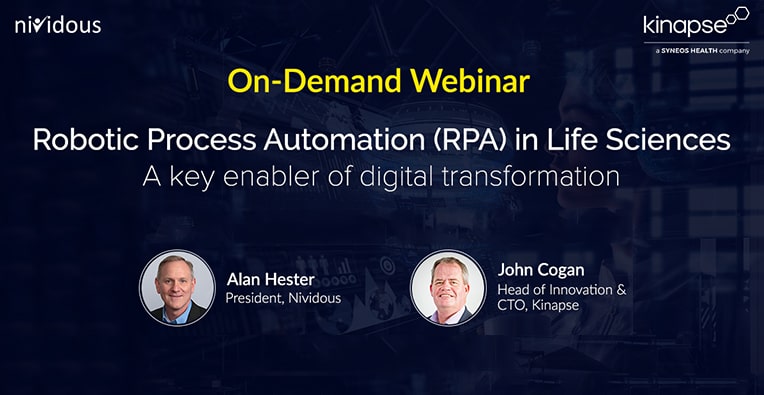Imagine a world where tedious lab tasks are automated, freeing scientists to focus on groundbreaking research and life-saving discoveries. This isn’t a futuristic fantasy – it’s the reality being unlocked by Robotic Process Automation (RPA) in the life sciences industry. From clinical trials to drug discovery, RPA is transforming the way we approach healthcare, paving the way for a brighter future.

Image: nividous.com
RPA is revolutionizing life sciences by automating repetitive tasks, reducing human error, and freeing up valuable time and resources. It’s not about replacing scientists; it’s about empowering them to achieve more. This article will delve into the world of RPA in life sciences, exploring its impact, uncovering its potential, and illuminating its role in shaping the future of healthcare.
The Rise of RPA: Transforming a Complex Landscape
Life sciences is a complex and data-intensive industry, characterized by intricate processes, meticulous documentation, and an ever-growing demand for precision and efficiency. Data entry, clinical trial management, regulatory compliance, and research analysis are just a few examples of tasks that often consume valuable time and resources. Traditional methods, reliant on manual processes, can be prone to human error, leading to delays, inefficiencies, and even missed opportunities.
This is where RPA steps in, offering a revolutionary solution. RPA software robots, designed to mimic human actions, can seamlessly automate repetitive tasks across various systems and applications. These robots can access data, populate forms, generate reports, and perform other tasks with speed and accuracy, freeing up human expertise for more strategic and creative endeavors.
RPA in Action: Transforming Clinical Trials & Beyond
In clinical trials, data collection and management are critical elements, RPA can streamline these processes, ensuring accuracy and compliance, while minimizing human error. Data entry, patient data management, and protocol adherence are tasks that can be effectively automated, creating efficiencies and improving patient safety.
The benefits of RPA extend far beyond clinical trials. In drug discovery, for example, RPA can play a crucial role in analyzing vast datasets, identifying potential drug candidates, and accelerating the research process. In regulatory affairs, RPA can assist in navigating complex compliance requirements, automating processes like document review and submission.
Empowering Scientists: Unlocking the Potential of Innovation
RPA is not just about automation; it’s about empowerment. By automating repetitive tasks, RPA frees up scientists, researchers, and healthcare professionals to focus on what they do best: innovation. They can now delve deeper into data analysis, develop novel therapies, and explore new frontiers of scientific discovery.
Imagine researchers focused on developing personalized therapies, no longer bogged down by tedious data entry or regulatory compliance. Instead, they’re empowered to analyze complex genetic data, identify specific patient needs, and create truly tailored treatments. RPA enables this dream, fostering a future where healthcare is personalized, efficient, and focused on individual needs.

Image: www.i2econsulting.com
The Future of Life Sciences: Embracing a New Era
The adoption of RPA in life sciences is gaining momentum, with companies across the globe recognizing its transformative potential. As the technology continues to evolve, we can expect even more impactful applications, including:
- AI-Powered RPA: Integrating artificial intelligence into RPA systems will create even more intelligent solutions capable of learning, adapting, and making complex decisions.
- Process Orchestration: RPA platforms are becoming increasingly sophisticated, enabling the automation of multiple processes and workflows, creating seamless interconnected systems.
- Cloud-Based RPA: Moving RPA to the cloud offers scalability, flexibility, and cost-effectiveness, making it accessible to organizations of all sizes.
Navigating the Path: Expert Insights and Actionable Tips
Implementing RPA successfully requires careful planning and execution. Here are some key insights from experts in the field:
- Focus on Business Needs: Identify specific tasks that are repetitive, time-consuming, and prone to error. Start with small wins and gradually scale up your automation efforts.
- Choose the Right Tools: Select RPA platforms that align with your specific needs, considering factors like scalability, integration capabilities, and ease of use.
- Start with a Pilot Project: Test your RPA solutions in a controlled environment before deploying them across the organization.
Rpa In Life Sciences
A New Paradigm: Reimagining Healthcare
RPA is more than just a technological advancement; it’s a powerful tool for change, transforming the life sciences industry and reimagining the future of healthcare. By freeing up time and resources, improving efficiency, and minimizing error, RPA empowers scientists and researchers to focus on what truly matters: finding new cures, developing personalized therapies, and improving the quality of life for everyone.
As you step into this exciting new era of life sciences, embrace the potential of RPA. Explore the possibilities, embrace the opportunities, and join the revolution that is transforming healthcare for the better.





